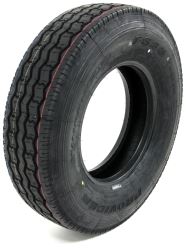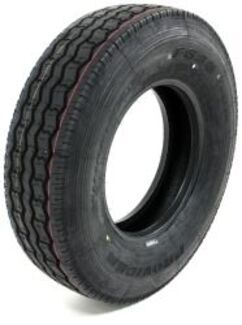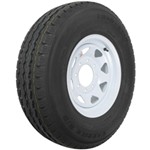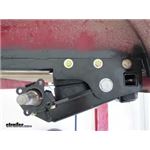
Correct Trailer Tire Pressure & What Does Under-Inflation Do to a Tires Weight Capacity
Question:
After a recent blowout on a relatively new E rated tire, I would like to move up to F or G rated tires for my 5th wheel trailer with a GVW of 14,000. My concern is the availability of 90 and 110 psi air pressure sources when going to the higher rated tires. I check air pressure on my current tires before each outing and sometimes struggle to reach 80 psi with the sources readily available to me. Would there be any improvement in going to the G or F rated tires if I were only able to run them at 80 psi pressure?
asked by: Ed S
Helpful Expert Reply:
No matter what, special trailer (ST type) tires should ALWAYS be operated in a fully-inflated state. All such tires indicate on their sidewall the maximum psi pressure the tire can hold. You want to keep your tires at this cold tire pressure. (Naturally they will build up more pressure from the heat generated by driving, but at the start of your travel day their cold pressure should always be the maximum pressure noted on the sidewall.)
Special trailer tires are built with stiffer sidewalls to handle vertical loads (rather than with flexible sidewalls that enable better cornering) and unless the tires are fully inflated they cannot deliver their rated weight-carrying performance.
All the tires we sell, such as the Provider ST235/85R16 Radial Trailer Tire # TTWPRG235R16 you referenced, have a weight rating that is dependent on the correct psi pressure. This tire is rated for a maximum load of 4400-lbs at 110-psi pressure. Lower operating pressure would mean the tire will develop more heat and not be able to carry its rated load. Since heat is a tire's worst enemy, observing weight capacity, speed rating and appropriate tire pressure are important to maximizing the life of the tire.
Choose your trailer tires so that you have enough rated weight capacity for the trailer's maximum GVWR along with some safety margin. Running a tire below its maximum capacity means a lower operating temperature and that will tend to lead to longer tire life.

Product Page this Question was Asked From
Provider ST235/85R16 Radial Trailer Tire - Load Range G
- Trailer Tires and Wheels
- Tire Only
- Radial Tire
- Load Range G
- 235/85-16
- 16 Inch
- M - 81 mph
- Taskmaster
more information >
Featured Help Information
Miscellaneous Media

Continue Researching
- Shop: Curt Wheel Chock Set w/ Handles and Mounting Brackets - Solid Rubber - Qty 2
- Shop: Dexter Trailer Springs Over-Under Conversion Kit
- Search Results: axle flip
- Shop: Buyers Products Trailer Tongue Toolbox - Black - 18 x 19 x 36
- Search Results: trailer storage
- Shop: Curt T-Connector Vehicle Wiring Harness with 4-Pole Flat Trailer Connector
- Shop: Karrier ST175/80R13 Radial Trailer Tire w/ 13" Aluminum Wheel - 5 on 4-1/2 - LR D - Black
- Shop: Aluminum Hi-Spec Series S5 Trailer Wheel - 13" x 5" Rim - 5 on 4-1/2 - Black
- Shop: Curt Adjustable 2-Ball Mount - 2" Hitch - 5-1/2" Drop, 4-1/2" Rise - 15K
- Shop: Trailer Wiring
- Shop: Trailer Hitch
- Q&A: Can 12 Inch Trailer Tires and Wheels be Replaced with 13 Inch
- Search Results: 2 receiver
- Search Results: adjustable hitch
- Search Results: curt hitch
- Q&A: 10k Dexter Replacement Hub for a 8-415
- Search Results: 44649
- Video: Choosing the Right Trailer Wiring
- Article: Brake Controller 7- and 4-Way Installation Kit (ETBC7)
- Video: Choosing the Right Brake Controller
- Search Results: 68149
- Q&A: Wiring a Camper Shell Third Brake Light on a 2017 Chevrolet Silverado
- Article: Trailer Wiring Diagrams
- Article: How to Choose the Right Trailer Hitch Class
- Q&A: Adding Brakes to a Mobile Home Axle
- Shop: Brake Controller
- Shop: Fifth Wheel Hitch
- Article: Trailer Tire Sizing
- Q&A: How to Determine if Trailer Axle is Not Aligned and How to Measure to Replace Trailer Axle
- Shop: Suspension Enhancement
































